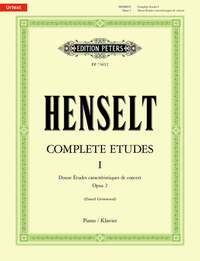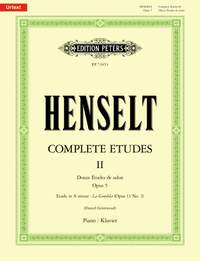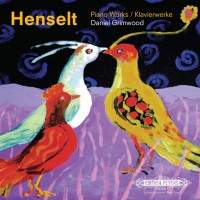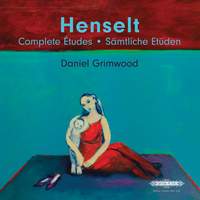Interview,
Daniel Grimwood on Adolph von Henselt

Composer and pedagogue Adolph von Henselt (1814–1889) is considered to be one of the founding fathers of the Russian School of piano playing. His music was well-known during his lifetime, and some of the greatest virtuosos of the nineteenth century (including Clara Schumann, Franz Liszt, Hans von Bülow, and Alexander Scriabin) performed his compositions.
The two sets of Etudes (Opp. 2 and 5) were composed just before Henselt moved permanently to Russia. The new Edition Peters Urtext edition collects each set in its own volume. Volume one contains Douze Études caractéristiques de concert, Op. 2 as well as a selection of Henselt’s Exercices préparatoires, and volume two includes Douze Études de salon, Op. 5 and two additional etudes. This new edition is the only available modern Urtext of these important piano works.
Editor Daniel Grimwood, one of the composer’s most highly regarded interpreters, kindly took some time to talk to me about the new edition and about the composer Adolph von Henselt.
How did you first come across Henselt’s work?
Through the musicologist Richard Beattie Davis; he was an expert on all things connected with Russian Music. He collected all of the first editions from the Belaieff publishing house in Russia for a book he was writing, and wanted me to help catalogue the collection because I can read Cyrillic, so that was quite useful for cataloguing them and putting them in alphabetical order. That was a weekend job for me when I was in my teens.
Every now and again I’d come across a score that looked interesting and so I would try it out on his piano. One day when I was doing this he put the Henselt Etudes in front of me and said "why don’t you try these?". They were so difficult, but the tunes are great and contain some really memorable music. He then showed me the piano concerto, and that began my love affair with Henselt’s music.

Despite the fact he was admired by his contemporaries, his compositions are a bit neglected today. Why do you think that is? Do you think that is anything to do with the difficulty of his compositions?

Well people have said that, but we live in a world where people regularly play Brahms two, so I don’t really accept that. I recently gave a Henselt day at the Royal College and we had four of their best students each playing one of the Henselt Etudes absolutely magnificently. So the technical difficulty clearly isn’t the barrier in this day and age. I think the reasons might be more political.
We can see from the recordings by Eileen Joyce, Benno Moiseiwitsch, Rachmaninoff himself; they all clearly played Henselt and considered him an important composer. What changed since they were recording? Well I think the Russian Revolution happened, and as he was sort of an adopted Russian composer, perhaps they didn’t want to lay claim to a composer with a foreign name. I think that his German name may have initially endeared him to the Russians, but he moved in upper class circles after he moved there, and that may have alienated him from the state afterwards. I might be wrong about this though. Sometimes composers do just simply fall out of fashion, and you can’t really see any rhyme or reason why.
Why do you think that it is important to learn and perform Henselt?
As the teacher of Nikolai Zverev, who taught Scriabin and Rachmaninoff amongst others, he’s really very important. I think that it is really important to understand the Russian piano compositions and piano playing school. It has been so influential in the 20th century. Those pianists who left Russia to teach elsewhere; their way of teaching is something that has shaped all other piano schools in some shape or form. There are a couple of seminal figures in the generation of that system, and Henselt was very much one of them. For a short period of time, Rubenstein and Henselt were working alongside each other at the conservatoire, and Henselt was made responsible for the ‘establishment for the training of noble women’ – young ladies of the nobility who would have been overseen by Henselt. That meant that all of the governesses teaching the next generation of young pianists would have been schooled in Henselt’s system.

What can we expect from your new edition of the Etudes, and what advice would you have for piano players who want to start learning them?

To take a deep breath first! These are not easy etudes by any stretch of the imagination. With the edition it occurred to me that they were published twice in his lifetime, so in some cases there are two very distinct versions of the same etude – and it is not always the case that the later version is superior to the first. They are different but each has its own wonderment. I would like for pianists to be able to choose which option they want by having all of the versions at their fingertips and they can then choose accordingly. It’s important that all the versions are there in one binding.
How did you find the editing process of it all?
I have had a great deal of help from the Gesellschaft in Schwabach locating the sources for me so I could see the first prints, and then the painstaking process of comparing them all, and the never-ending proof-reading! This is the first time I’ve edited anything, and I feel deeply honoured that it’s coming out in the green cover. If you are dealing with a composer that is relatively unknown there is a really big responsibility in both playing and editing the music, that he is not misrepresented. Based on having played the music myself for so many years, I am sort of steeped in his style. If there are inaccuracies I have a fair idea of what they are, I have seen enough of the autograph manuscripts (there aren’t that many available), to know that they have fingerings written by the composer in them. Therefore most of the fingerings from the earlier prints probably do originate from Henselt so I have kept them.
In addition to the Etudes you’ve recorded many other Henselt piano works too, what would say is your favourite?
Such a hard thing to answer! The Danklied nach Sturm [Op. 5 No. 6] from the Etudes I consider to be one of his greatest compositions. The Ballade [Op. 31] is a masterpiece, and is also one of the first pieces I learnt by Henselt. And of course the Piano Concerto [Op. 16], which was in his own day such an influential work that affected so many other composers; I will be returning to that as an editor. It’s quite a complicated project [editing the piano concerto] for various reasons. The score was heavily edited by Schumann and Ferdinand Hiller; vast swathes of the orchestration had been crossed out, so it is a case of finding what it is I want to present. Something for the near future.
This new Edition Peters Urtext edition includes Henselt's Douze Études caractéristiques de concert, Op. 2 alongside a selection of Henselt’s Exercices préparatoires. The only available modern Urtext edition of these important piano works.
Available Format: Sheet Music
This new Edition Peters Urtext edition includes Henselt's Douze Études de salon, Op. 5 with two additional etudes. The only available modern Urtext edition of these important piano works.
Available Format: Sheet Music
Daniel Grimwood shines a light on the music of Adolph von Henselt, one of the most admired Romantic composers and piano virtuosi of the 19th century. The album presents a rare collection of pieces, recorded in Schwabach in Germany, Henselt’s town of birth. Pianist Daniel Grimwood is a performer of international renown, combining an exceptional talent, rare versatility and refinement of technique, with an inquisitive and creative personality.
Available Formats: MP3, FLAC, Hi-Res FLAC
Following his acclaimed first recording of Adolph von Henselt's piano works, Daniel Grimwood now presents a unique recording of Henselt's complete Études coupled with the complete Préambules. This double album imaginatively places the two sets of Études Op. 2 and Op. 5 alongside Henselt's improvisatory 'Préambules', one in each key, and also includes the Étude in A minor and the Étude Op. 13 No. 2 La Gondola together with the Étude Au Jardin that Balakirev composed to honour Henselt's fiftieth anniversary in St Petersburg.
Available Formats: CD, MP3, FLAC, Hi-Res FLAC






